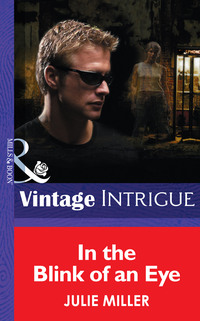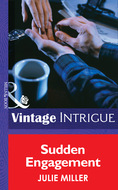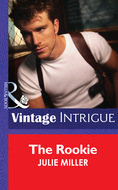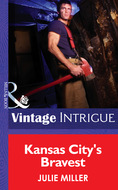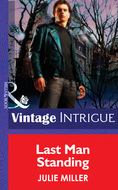Kitap dosya olarak indirilemez ancak uygulamamız üzerinden veya online olarak web sitemizden okunabilir.
Kitabı oku: «The Taylor Clan»
She’d never gotten to touch Mac like that before
She’d never touched any man like that.
She never thought she could.
Fingertips tracing the angles and dipping into the contours of his rugged face. Julia’s palms receiving a jillion little jolts of electricity as she rubbed them along his beard.
Nothing in her limited experience had ever made her so aware of a man.
In last night’s brief, charged moments with Mac, something inside her had awakened. All her schoolgirl dreams of what it might be like to be truly intimate with a man had escaped the little Pandora’s box she kept tightly locked deep inside her heart. That little locked box had saved her from humiliation more times than she cared to remember.
I’m thinking of you as a woman, he’d said.
Well, she was certainly thinking of him as a man….
In the Blink of an Eye
Julie Miller
MILLS & BOON
Before you start reading, why not sign up?
Thank you for downloading this Mills & Boon book. If you want to hear about exclusive discounts, special offers and competitions, sign up to our email newsletter today!
Or simply visit
Mills & Boon emails are completely free to receive and you can unsubscribe at any time via the link in any email we send you.
ABOUT THE AUTHOR
Julie Miller attributes her passion for writing romance to all those fairy tales she read growing up, and shyness. Encouragement from her family to write down all those feelings she couldn’t express became a love for the written word. She gets continued support from her fellow members of the Prairieland Romance Writers, where she serves as the resident “grammar goddess.” This award-winning author and teacher has published several paranormal romances. Inspired by the likes of Agatha Christie and Encyclopedia Brown, Ms. Miller believes the only thing better than a good mystery is a good romance.
Born and raised in Missouri, she now lives in Nebraska with her husband, son and smiling guard dog, Maxie. Write to Julie at P.O. Box 5162, Grand Island, NE 68802-5162.
THE TAYLOR CLAN
| Sid and Martha Taylor: | butcher and homemaker ages 63 and 62 respectively | |
| Brett Taylor: | contractor age 38 the protector | |
| Mac Taylor: | forensic specialist age 37 the professor | |
| Gideon Taylor: | firefighter/arson investigator age 35 the crusader | |
| Cole Taylor: | the mysterious brother (the family’s not quite sure what kind of work he does—undercover) age 30 the lost soul | |
| Jessie Taylor: | the lone daughter antiques dealer/buyer/restorer age 29 the survivor | |
| Josh Taylor: | police officer age 27 at 6'3", he’s still the baby of the family the charmer | |
| Mitch Taylor: | Sid’s nephew—raised like a son police captain age 39 the chief |
CAST OF CHARACTERS
MacKinley Taylor—His brilliant mind and legendary control can’t help him see. But they might help him see the truth.
Julia Dalton—How far will she go to help a childhood hero? She’s willing to risk her life—but does she dare risk her heart?
Jeff Ringlein—Mac’s protégé. Just who was he afraid of?
Melanie Ringlein—How much does a public servant’s pension pay, anyway?
Inspector Joe Niederhaus—An Internal Affairs investigator due to receive his gold watch. He plans to get his man one last time. Even if it’s the wrong one.
Inspector Eli Masterson—Joe’s partner. This Internal Affairs man has learned from the best. But who is receiving the benefit of his inside information?
Wade Osterman—A uniformed police officer with a bad habit of betting on the games.
Arnie Sanchez—Missing evidence would get his case dismissed.
Martha Taylor—Meddling mother #1. Is this matchmaker in over her head, trying to rescue her second son?
Barbara Dalton—Meddling mother #2. She is only trying to help her daughter.
Mitch Taylor—There’s a cover-up going on in his precinct. Is the traitor’s identity closer to home than he realizes?
For Scott and Ryne
Contents
Prologue
Chapter One
Chapter Two
Chapter Three
Chapter Four
Chapter Five
Chapter Six
Chapter Seven
Chapter Eight
Chapter Nine
Chapter Ten
Chapter Eleven
Chapter Twelve
Chapter Thirteen
Epilogue
Prologue
Mac Taylor adjusted his gold-rimmed glasses on the bridge of his nose and studied the slim band of light beneath the door to the Fourth Precinct Crime Lab. He glanced at his watch to check the time again. 1:13 a.m. A shuffle of movement drew his focus back to the door at the end of the hallway opposite his office.
“I thought I was the one married to my job.” Who would be in the lab at this hour? As sure and even as his footsteps down the deserted corridor, his mind clicked with possibilities.
Custodian? No. They weren’t allowed in the lab itself. Thief? In a police building with officers on duty twenty-four hours a day just one floor down? Not likely. Technician? The Fourth was a satellite unit that kept regular office hours. Only the main lab south of town stayed open around the clock.
With the possibilities systematically rejected, only one option remained. Trouble.
Tucking the manila envelope with the technical data he carried under his arm, he turned the knob and opened the door, identifying the intruder before he allowed himself to be heard.
“Jeff?”
His quiet voice startled the ponytailed chemist in the white lab coat. Jeff Ringlein hunched his compact shoulders over the stainless-steel counter, righting the instrument tray he’d hit with his elbow.
“Mac.” His hands stilled their work, but he didn’t turn around. “You’re here late.”
“So are you.” Mac strolled over to the center table, his long legs giving him an easy stride that belied the eagle-sharp observation of eyes that missed nothing.
A Bunsen burner on steady heat. An assortment of liquids in beakers. An open evidence bag, its label written in his own illegible scrawl. One of the perks of working as a forensic pathologist for the Kansas City Police Department was that he could delegate routine tests to a staff lab tech, and concentrate on assessing the crime scene and piecing together the entire case.
He didn’t recall this particular assignment.
“You on to something interesting?” he asked. Jeff had been right out of college when he started at the lab. Though technically proficient, he lacked the instincts to make his investigative work anything more than routine. His eagerness to please, though, had ingratiated him to his co-workers and earned a bit of indulgent patience from Mac.
So his rushed, toneless answer sounded perfectly normal. “I’m running a dye test.”
Mac eyed the twist of threads lying inside the bag, then surveyed the counter once more.
No microscope. How did he expect to ID the sample without one?
Mac leaned his hip against the table, banking his inquisitive nature in an effort to put Jeff at ease. “I don’t think the criminals will overrun the city if we knock off and get a few hours of sleep now and then.”
Jeff finally turned, but his dark-eyed gaze never quite met Mac’s. “What are you doing here?”
Fair question. “I’m testifying at Ned Prosky’s hearing later this morning. I wanted to double-check my facts.”
“He’s the alleged hit man?”
“Yeah. If I can put him at the scene of the crime, we can at least nail him for accessory. Dwight Powers is going after him as the trigger man, though.”
Jeff’s chin sank to his chest at the mention of the assistant district attorney’s name. He returned to his work. “Powers is pretty ruthless. Think you’ll win the case?”
Mac shrugged. He loved the immutable laws of science, the simplicity of seeing facts in black and white. But he accepted that most of the world evaluated things in shades of gray. “I just interpret the data. The rest is up to Dwight and the jury.”
“Yeah, well, good luck.”
“Thanks.” Mac shifted his weight onto both feet and fished in the pocket of his jeans for his keys. “Look. Whatever I gave you to do can wait until morning. Knock off and go home.”
“I will. As soon as I get this cleaned up. Good night.”
The anxious farewell pricked Mac’s curiosity even more than the incomplete experiment setup. “Everything okay?”
“Fine.” Jeff opened the cabinet above his workstation and lifted the box where samples were stored. Maybe he’d screwed up a test earlier, and was here to rerun it without the teasing of his fellow technicians. Mac’s prying wouldn’t help get the guy home to his wife any faster.
Mac squeezed the envelope in his hand. His company tonight would be printouts of DNA strands and microfibers. Jeff had a flesh-and-blood woman waiting for him. He couldn’t blame the guy for being impatient.
“Be careful, then.” He headed out the door, his curiosity unappeased, but his confidence in his staff intact.
That’s when the smell hit him. The sharp sting of mismatched chemicals stung his nose and made his eyes water. “Jeff, what are you…?”
Startled by Mac’s reappearance, Jeff lurched. A beaker flew from his hand and shattered on the countertop. “Leave me alone!”
When he spun around to confront Mac, his elbow hit the Bunsen burner and toppled it.
“Kill the flame!” Mac ordered. His report flew into the air as he snatched the fire extinguisher by the door and dashed across the room.
“Just let me do my job.” Jeff’s hand curled into a fist. He cocked his arm back to take a swing at Mac. Mac ducked, but avoiding the flying fist wasn’t necessary. Jeff froze, halfway through the roundhouse punch, and stared at the wisps of flame consuming the sleeve of his white lab coat. “Oh my God—”
“Move!” Mac pulled the trigger and doused Jeff’s arm with the suffocating foam. “Get out of here!” He nodded over his shoulder and turned the extinguisher on the counter. “What the hell…?”
Mac shoved his fingers beneath his glasses to wipe the burning film clouding his eyes, and looked at the counter a second time to be sure his vision wasn’t playing tricks on him. An assortment of plastic evidence bags floated in a pool of clear amber liquid inside the metal tray. “It’s all contaminated.”
Destroying evidence.
Incompetence? Or sabotage?
Acting on instincts ingrained more deeply than self-preservation, Mac reached for the bags. Hair, filaments, cloth, fingernails and more—he rescued them from the toxic pool and tossed them aside.
He saved two, five, six bags before the sharp thwack at the base of his skull knocked him, belly first, onto the counter. An explosion of fireworks shot through his brain. He staggered to his feet and turned to see the missing microscope—raised high in Jeff’s fist, ready to strike again.
Mac reached behind him for the first available weapon to defend himself against the unexpected attack. His fingers touched the metal tray. He gripped it in his fist and slung it straight at Jeff’s face.
The flying steel knocked him back a step. But the corrosive liquid that splattered across his face proved even more effective. The microscope crashed to the floor as Jeff doubled over, clutching at his face and screaming in pain.
“What the hell were you thinking?” Slightly breathless from the combination of poisonous fumes and the blow to the head, Mac staggered over to Jeff and turned him toward the door and fresh air. “Let’s get out of here.”
“You can’t know.” Jeff wheezed through the stinging pain. “He’ll hurt Melanie.”
“Who?” Mac recognized the name of Jeff’s wife, but the plea made no sense.
“I have to do my job.” Jeff shoved Mac into the wall and swayed back to the counter.
Mac followed a step behind.
A step too late.
Jeff hit a switch, pulled a lighter from his pocket, and click…
The gas from the Bunsen exploded into a fireball.
The toxic air ignited, consumed Jeff in its fiery claws. The names on the plastic bags shrivelled and died as they melted into a puddle. Like relentless, grasping hands, the flames reached out for their next victim.
Mac backpedaled his feet and tried to retreat.
But the shockwave tossed him across the room and slammed him into the wall. The impact of shattered glass and scorching metal pierced his skin like gunfire.
Those immutable laws of science followed their true nature, and plunged Mac into oblivion.
Chapter One
Six Weeks Later
“What have you gotten me into this time?”
Julia Dalton paused at the threshold of the sturdy rock house and held her breath. Literally.
Nestled among two-story relics from the 1920s, the high ceilings and oak floors spoke of the leftover charm of this once-wealthy neighborhood near the Kansas City Museum. But this sweet little cottage just northeast of the Market area where she grew up had lost something over the years. What time and urban fatigue hadn’t done to the house, an interior tornado bent on destruction had.
Her mother, Barbara, followed a step behind. “Oh, my. What’s that smell?” Her scrunched-up nose brought an unexpected grin to Julia’s freckled face.
The faint pungency of formaldehyde hung in the air. “The sewer’s not backed up, is it?” asked Julia.
She lifted her foot over the crumpled doormat and led the way into the living room. Her mother’s best friend, Martha Taylor, closed the door and joined them. “No. Everything in the house works fine.” She shrugged her shoulders, clearly embarrassed by the mess, but ready with an explanation. “My oldest son, Brett, bought this place to fix up and resell. He’s just getting started on the remodeling, but the plumbing is fine. It’s the current tenant—”
“Martha.” The clear snap of her mother’s voice captured Julia’s attention as well. She caught the unsubtle message flashed from hazel eyes to blue.
Martha, taller, and a tad thinner, shook her head. “She’s bound to notice.”
Julia knew the dynamic duo was up to something, but she could never be sure where her mother’s good intentions might lead, much less when she was in cahoots with her lifelong pal since kindergarten.
She’d been home only a few days, but the urgency the two older women had used to get her out of the house that morning made her wonder if she had already overstayed her welcome.
“Anyone want to offer an explanation yet?” she asked. “You said you needed a nurse, not a housekeeper.”
Martha perked up at Julia’s comment. “As a professional health-care worker, do you think living like this presents a health risk?”
“Not if you’re a cockroach or a rat looking to make a new home.”
Julia stacked the magazines strewn across the couch and set them on the end table. She checked the dark stain on the seat cushion beneath for dryness before plopping her backpack that served as both purse and overnight bag on the empty spot.
Then she folded her arms across the front of her denim jacket and switched roles from daughter to authority figure. “So who’s going to fess up? You told me to pack a bag and my credentials because you had an emergency at home. But we didn’t walk across the street to your condo, Martha. We drove here. What’s going on?”
Though humor had always been her first best line of defense, she hadn’t managed the night shift of one of Chicago’s toughest emergency rooms without learning how to throw around a little intimidation. She knew how to draw up all five feet, six inches of her blocky figure into a not-to-be-messed-with show of force.
Unfortunately, she’d learned the trick from her mother. Barbara mimicked her daughter’s stance. “Don’t get mad at Martha. I agreed with her totally on this. I thought it was a good idea.”
“I’m not mad. I just want to know—” A solid thump from the back of the house rattled the chandelier above her head. Julia jumped in her boots. But other than a quick catch of her breath, she didn’t let her mother see how the unexpected sound unnerved her. A sense of impending dread pulsed through her at the uneven tread of heavy footsteps advancing toward them.
“Who’s the patient, Martha?” These women were not given to lying. But they might fudge a little bit if they believed it would help someone they loved. “Mom?” she prompted.
“Ma?!”
She knew that voice. Years ago she’d memorized the quiet authority, the distinct pitch of it. The deep tone had a raspy, strident ring to it now. But she’d know that voice anywhere.
Once, it had saved her life.
Today, it could destroy her.
“I’m not ready for this.”
Shreds of panic plummeted to her toes, robbing her of conscious thought and reliable self-assurance. She snatched her bag and flung it over her shoulder. Her mother hadn’t known then. She didn’t know now. Julia had never told a soul. Her humiliation ran too deep. The futility of her feelings was a raw, vulnerable wound, barely shielded now after all that had happened in Chicago.
She had to go. She had to…
“Ma, you there?”
She froze in her tracks when she came face-to-face with the man braced in the archway where the living and dining rooms joined.
Mac Taylor.
As tall and lean as she remembered. The broad shoulders and endless stretch of legs beneath the gray sweatshirt and faded jeans were the same. The long, dextrous fingers still fascinated her. But the lack of meat on his angular frame gave him a hard edge. And the tight slice of his mouth across the golden scrub of a beard indicated he was angry.
She’d never seen him angry before.
“Ma?”
“I’m here, son.” The fatigue in Martha’s voice distracted Julia’s attention for a moment. Like her own mother, Martha would be in her early sixties. But the heartbreak that suddenly creased her face made her seem years older.
“Who’s with you?” Julia turned back at Mac’s demand.
Time and injury hadn’t been kind to her childhood hero. His sandy blond hair had lost its burnished lustre. All trace of curl had been cut away, leaving it a short, spiky length. Jagged streaks of newly healed, baby-pink skin branched out over his left cheek and across his forehead in an intricate web of fresh scars.
But it was his eyes that held her captive.
Beneath the cut that bisected his eyebrow, a tiny white blemish blotted the symmetry of pupil and iris in his left eye. And the right looked through her, past her, without seeing her.
He was blind.
Those cool chips of granite, once silver behind the gold of his glasses, that she’d fantasized about through her teenage years, were blind.
Her fears scattered as shock rendered her silent. Her lips worked to mouth the question, Why?
“Ma? Who’s with you?” he repeated.
Tears of sorrow, and maybe even pity for all he had lost, stung her eyes.
Martha shrugged off her son’s harsh tone. “Barbara Dalton.”
He tipped his face up, sniffing the air with an almost feral focus. “Who else?”
Julia blinked back the moisture in her own eyes, sensing sympathy would not be appreciated. “It’s Jules, Mac. Julia Dalton.”
“Son of a bitch.” His face flushed with emotion, and he whipped around. His shoulder banged into the archway, knocking a picture crooked on the wall. A string of succinct, damning curses accompanied him as he stormed back through the house.
“MacKinley Taylor!” Martha dashed through the archway, scolding after him. “She’s a nurse, son, she can help—” A door slammed, cutting her off, leaving Julia and her mother standing in shocked silence.
Several moments later, Martha returned. The strain on her face aged her even more. “I’m afraid I brought you here under false pretenses.” She rolled her gaze heavenward and clenched her mouth in an effort to stem her tears. “Of all my children, that one was never a bit of trouble. Never once gave me cause for concern. And now, when he does need me, he won’t let me help.”
“He needs bandages on those eyes.” The practical professional inside her kicked in. But decades-old friendship softened her scold to a gentle reprimand. “The damage to that tissue is recent enough that it could still breed infection. At the very least he should wear dark glasses. The light must be killing him.”
Martha went to the picture on the wall and straightened it. “I almost think he enjoys it. The pain, I mean.”
With an instinctive empathy, Julia knelt down to retrieve the wadded newspaper pages from beneath the coffee table. “Why would he punish himself that way?”
“I think he feels responsible for the accident.”
Julia straightened, hating her natural curiosity and abundant concern. Why couldn’t she just let things go? “What happened?”
Martha’s back seemed to creak with the effort of bending down and picking up a pillow that was half a room away from the chair to which it belonged. “There was an explosion at the lab where he worked. He suffered chemical burns, shrapnel wounds.” The hopelessness in Martha’s voice tore at Julia’s heart. Then her voice brightened a bit with a shallow smile. “There’s a chance the blindness isn’t permanent. He nearly lost one eye. It’s damaged beyond repair. But his right eye can be retested once he’s healed. He may be eligible for a lens transplant. If the eye’s strong enough. But he’s so stubborn. He’s so…defeated.”
Julia shoved the newspapers into the trash can beside the desk, turning away from her mother who was hurrying to Martha and sweeping her into a comforting hug. She tried to remain clinical. “Transplant operations are fairly common, and generally quite successful. Partial or complete sight is restored, and the postoperative healing process isn’t too traumatic.”
“Don’t quote me facts.” Unfocused anger replaced the quaver of tears in Martha’s voice. “The success of the operation makes no difference if he won’t take care of himself! Look how he lives. Half the time he hides out in his room behind a locked door. He crashes around this house without regard for his safety, and has a temper tantrum whenever someone tries to help. He’s chased off three nurses already.” The anger receded behind a plea from the heart of a desperate mother. “You’re my final hope. Please. As a favor for old times’ sake?”
Julia clutched the straps of her black leather pack and squeezed until her knuckles turned white. She eyed her mother, whose arm draped in support and protection around Martha’s shoulders. Why hadn’t her mother done the same for her?
She choked back the traitorous thought. She hadn’t told her mother about Chicago. About that humiliating morning in Anthony’s office. She’d simply shown up on her parents’ doorstep last Saturday morning, a welcome, though unexplained, surprise. She’d resigned from her job at the hospital, closed up her apartment and headed for home. She needed time to think. Time to heal. Time to be safe.
She shook her head and, palm raised as though warding off the threat of danger, backed toward the door. “I can’t handle a serious case right now. I’m sorry Mac’s in trouble. I’m sorry for your whole family. But I can’t do this.”
Julia spun around and shot out the front door into the crisp autumn air, anxious to escape the pressure, the disappointment, the guilt. Halfway down the front walk to her car, she heard the door shut behind her.
“I didn’t raise a quitter.”
Julia halted at the sound of her mother’s voice. On a deep breath, she turned and pleaded with those eyes, part gold, part green, just like her own. “Someone else can help Mac. There must be hundreds, thousands, of qualified nurses in the Kansas City area. Reliable, tough—”
“I’m not talking about Mac.”
A bit of the concern she’d seen etched in Martha’s face now lined her mother’s. “What do you mean?”
Barbara closed the distance between mother and daughter. Physically, and emotionally. “I’ve never seen my little girl tuck her tail between her legs and run home to hide before.”
Julia held her tongue, not knowing what to say. She’d tried to be cheerful, talk of good times, help around the house. But she could see now that she hadn’t fooled her mother for one instant. “I’m sorry if I worried you. I didn’t mean to.”
Barbara smiled. “I’m a mom. Even after thirty years, it goes with the territory.” She reached out and brushed one of the short curls that crowned Julia’s head off her face. “I don’t know what happened to you in Chicago, but I’m sorry it hurt you. You are always welcome at home, and I am always ready to listen, if you decide you need to talk. But, in the meantime, I think you should do something. Keep busy, don’t just brood.”
Julia clasped her mother’s hand and squeezed it tight. “I love you for your concern, but I don’t think this is the right thing for me to do.” She looked up to the house, seeing it as a distant symbol of lost hope and shattered dreams. “He needs so much. And I don’t just mean nursing care. I don’t think I have it in me to give him enough of anything right now.”
The answering silence brought Julia’s attention back to her mother’s face. Those hazel eyes looked sad in the grim expression Barbara wore. “Martha Taylor has been my friend longer than you’ve been alive. You and her son Cole were classmates and good friends for many years. That family’s in desperate trouble now.” Julia sighed right along with her mother. “I won’t insist on anything that would put you or your feelings in danger. I just want you to remember that, sometimes, giving is what enables us to move beyond the fear or sorrow, and allows us to find a way to heal ourselves.”
Julia rolled her eyes heavenward, seeking the strength that seemed to have abandoned her. Growing up hadn’t been easy for her mother. But that life experience had given her a wisdom and insight that had surprised her daughter more than once. Maybe she did know something about healing the spirit, about mending a shattered self-image, about piecing together the will to move forward with her life. She looked at her mother, wanting to believe in that wisdom.
“I don’t remember you being this philosophical, Mom.”
“I don’t remember seeing you in this much pain.”
Julia considered the importance of family and friendship, of loyalty and love. She weighed the value of her actions in Chicago and what they had revealed about her true character. Her instincts had failed her, and she’d been too stubborn to listen to common sense. She had fallen short of her parents’ expectations of her, far short of her own expectations for herself.
Maybe she owed them a bit of penance until she could figure out how to make things right again.
If only she wasn’t so afraid of making things worse.
But Barbara Dalton hadn’t raised a quitter.
“All right.” She stepped forward and wrapped up her mom in a hug. The tight embrace around her own shoulders might be the only strength she’d have to sustain her through this. “I’ll give you twenty-four hours. We’ll see how it goes. But you and Martha need to be looking for a backup plan.”
She felt the tension in her mother relax. “Thank you, Jule.”
Embarrassed by the simple gratitude, Julia separated and trudged up to the door. “Twenty-four hours,” she reminded her.
To do a favor for an old family friend?
Or to survive a sentence from hell?
MAC WAITED A GOOD ten minutes after his mother’s goodbye before leaving the sanctuary-slash-prison of his bedroom. At least he thought it was ten minutes. His internal clock seemed to have gone haywire in the same instant the toxic flames and lacerations scarred his throat and tore the sight from his eyes.
Ten minutes. Five. Twenty.
What did time matter to a man who served no useful purpose?
The dull ache behind his left eye was a constant reminder of all he had lost. And no amount of scientific or medical training could bring back the competency of a man who had lived by his senses, his powers of observation, his ability to see something once and identify its attributes. He was a man of science, a man of thought and reason. He’d never worried about how to get from point A to point B. How to find the toilet across the hall. How to pick out socks that wouldn’t clash with his jeans.
He’d never thought about living without his sight.
Mac swung his bare feet off the edge of the bed and slipped into the beaten loafers that had become his uniform of late. He inhaled a deep, fortifying breath and stood, steadying himself by grabbing on to the headboard. He waited for the waves of dizziness to pass, knowing damn well these vertigo attacks were a result of panic and disorientation, and had no bona fide physical cause.
Only when his shadowed world stopped spinning did he move. Three steps from the bed to the dresser. He trailed his fingertips along the scarred oak top, sticking a moment where the old varnish had pooled, sliding past the spot where there was no varnish at all. His hand hit a smooth, hard object and glass clinked against glass.
Tempting defeat, he turned his hand, lifted the glass to his nose and sniffed. Nothing. Plain water. Maybe the other…
Ücretsiz ön izlemeyi tamamladınız.

